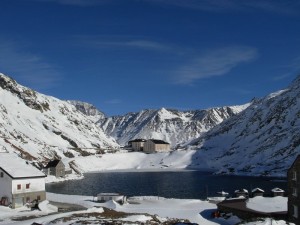
Il Gran San Bernardo luogo di tormento e del primo intervento di soccorso alpino di cui si abbia notizia.
Così è descritto in un testo pubblicato nel 1878 da William Stubbs, vescovo e storico inglese.
| ‘Even amidst the wearisome sameness of the Canterbury letters we now and then get a glimpse of life, such as in the letter of Master John from Lombardy, when he explains why he could not write from the Great S. Bernard. | ‘Anche in mezzo alla monotonia tediosa delle lettere di Canterbury ci sono ed è possibile trarre scorci di vita, come nella lettera di Master John dalla Lombardia, che spiega perché non ha potuto scrivere dal Gran San Bernardo. |
| “Pardon me for not writing. | “Perdono per non aver scritto |
| I have been on the Mount of Jove; on the one hand looking up to the heavens of the mountains, on the other shuddering at the hell of the valleys; feeling myself so much nearer to heaven that I was more sure that my prayer would be heard. | Sono stato sul Monte di Giove (il Gran San Bernardo NdT); da una parte guardavo in alto i cieli sulle montagne, dall’altra rabbrividivo all’inferno delle valli; mi sentivo così vicino al cielo che ero sicuro che la mia preghiera sarebbe stata ascoltata. |
| “Lord,” I said; “restore me to my brethren, that I may tell them, that they come not into this place of torment.” | “Signore,” dissi; “restituiscimi ai miei fratelli, perché io possa dire loro, che non vengano in questo luogo di tormento.” |
| Place of torment, indeed, where the marble pavement of the stony ground is ice alone, and you cannot set down a foot safely; where, strange to say, although it is so slippery that you cannot stand, the death, into which there is every facility for a fall, is certain death. | Luogo di tormento, infatti, dove il suolo sassoso pare un pavimento di marmo ma è solo ghiaccio, e non è possibile posare il piede in modo sicuro; dove, strano a dirsi, sebbene è così scivoloso da non poter restare fermi, la morte che qui è sempre facilitata da una caduta, è morte certa. |
| I put my hand in my scrip, that I might scratch out a syllable or two to your sincerity; lo, I found my ink-bottle filled with a dry mass of ice: my fingers, too, refused to write: my beard was stiff with frost, and my breath congealed into a long icicle. | Ho messo la mano nella mia bisaccia, per poter scrivervi una sillaba o due; ecco, ho trovato la mia bottiglia di inchiostro riempita con una massa solida di ghiaccio: anche le mie dita, si sono rifiutate di scrivere: la mia barba era rigida dal gelo, e il mio respiro congelato in un lungo ghiacciolo. |
| I could not write the news I wished.’ | Non ho potuto scrivere mie notizie come avrei voluto.’ |
| But this is a digression, and such scraps are not common … | Ma questa è una digressione, e simili frammenti non sono comuni … |
Testo tratto da: Seventeen lectures on the study of medieval and modern history and kindred subjects (1886) by William Stubbs – traduzione italiana di Gian Mario Navillod.
Il testo è disponibile secondo la Creative Commons Attribution-ShareAlike License; possono applicarsi condizioni ulteriori. Vedi i Terms of Use e le Privacy Policy.
Coolidge precisa che l’autore è John de Bremble:
| “Master John de Bremble, a monk of Christ Church, Canterbury, sent to Rome on the business of his house. The letter is addressed to his sub-prior Geoffrey, and describes his passage of the Great St. Bernard in February 1188.” |
“Mastro John de Bremble,un monaco della Chiesa di Cristo di Canterbury, scrive a Roma sulle attività della sua casa. La lettera è indirizzata al suo superiore Geoffrey, e descrive il suo passaggio del Gran San Bernardo nel febbraio 1188.” |
William Augustus Brevoort Coolidge, Swiss Travel and Swiss-Guide Book, Longmans Green & Co., London 1889 pag. 8 – Versione digitale disponibile a questo indirizzo: http://doc.rero.ch/record/17156
Post del 22.04.2014 ultimo aggiornamento 23.09.2024
